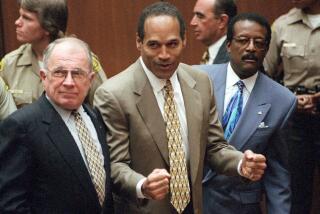J. David’s Legal Firm Negotiating on Return of Fees
- Share via
SAN DIEGO — Rogers & Wells, the prominent law firm that represented the fraudulent J. David & Co., is now negotiating with the J. David bankruptcy trustee to reach an out-of-court settlement and avoid a costly lawsuit to recoup more than $500,000 paid to the firm in legal fees.
If no settlement is reached in the next two weeks, bankruptcy trustee Louis Metzger will take legal action against Rogers & Wells, attorneys for Metzger said in federal court Wednesday.
Negotiations began about a month ago, according to Dennis Kinnaird, a Rogers & Wells’ outside attorney. “We don’t think too much of their claims,” he said.
Rogers & Wells has already agreed to pay as much as $40 million to settle more than 300 lawsuits filed by former J. David investors. The law firm has been accused by the former investors of aiding in the J. David scandal by convincing regulators that J. David’s foreign currency trading accounts were not required to be registered as securities.
Metzger may have claims to a portion of those funds because some of the plaintiffs owe the bankruptcy estate money, Ben Silverman, Metzger’s attorney, told U.S. District Judge J. Lawrence Irving on Wednesday.
$9.4 Million Cash on Hand
Meanwhile, under questioning from Irving, Silverman predicted that liquidating the assets of the far-flung, fraud-filled J. David & Co. and distributing the remains to former investors and creditors could take another two years.
The bankruptcy estate now has more than $9.4 million in cash on hand and expects to have about $10.1 million by month’s end from various settlements, Metzger said in his seventh state-of-the-estate report since he became J. David bankruptcy trustee two years ago.
J. David attracted about $200 million from 1,500 investors with promises of annual returns of up to 40% from foreign currency trading activity. In truth, virtually no trading was conducted by company founder J. David (Jerry) Dominelli, and investor losses totaled about $82 million.
Dominelli is now serving a 20-year federal prison term for fraud and income tax evasion. A federal grand jury is continuing its investigation into other J. David participants.
Metzger has filed 390 lawsuits against former investors in attempts to recoup so-called preference payments--funds paid out by J. David in the 90 days preceding its February, 1984, bankruptcy--and for allegedly fraudulent conveyances. The total sought is between $34 million and $36 million, Metzger said. He declined, however, to predict what percentage of those funds he believes he will eventually recover.
32% of Company Held
Metzger also disclosed that he will meet next week with officials of San Diego-based Yuba Natural Resources to discuss settling J. David’s $2.5-million investment in the company.
J. David & Co. owns a 32% interest in Yuba Holdings Inc., a partnership that controls about 44% of Yuba, which controls 10,000 acres of gold, aggregate and silica reserves in Northern California.
How much the $2.5-million investment is now worth remains uncertain, however. “We haven’t attempted to put any value on it,” Yuba Chairman Richard Silberman said.
Finally, both Irving and Metzger personally assisted one of the three local charities that returned some of the money they received from J. David, it was learned Wednesday. Irving and Metzger each contributed funds to the Child Abuse Prevention Foundation, which returned about $3,000 to the J. David bankruptcy estate.
The foundation was one of 28 nonprofit groups that Metzger had asked either to return funds or waive a statute-of-limitations clause that would have prevented Metzger from filing suit to recover the money.
Seventeen of the organizations agreed to the waiver, three settled, five of the claims were dropped by the trustee and three organizations have been sued, Metzger said.
More to Read
Inside the business of entertainment
The Wide Shot brings you news, analysis and insights on everything from streaming wars to production — and what it all means for the future.
You may occasionally receive promotional content from the Los Angeles Times.










